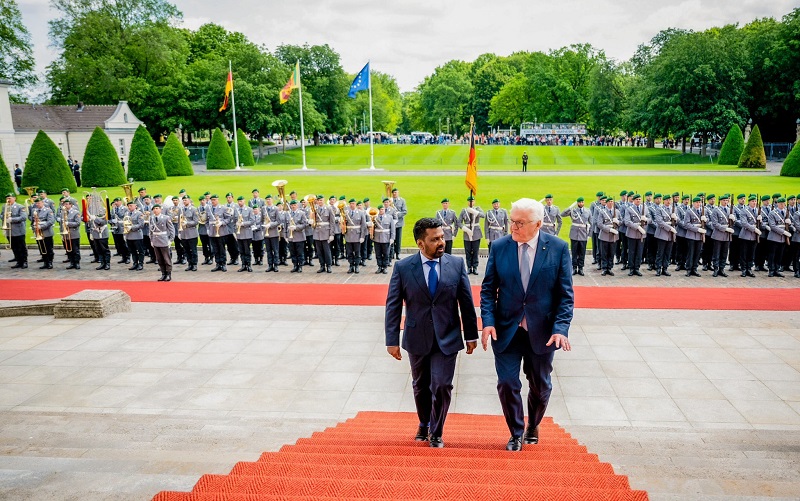Berlin Rolls Out the Red Carpet as Sri Lanka’s President Anura Receives Full Military Honours in Landmark Visit

(Lanka-e-News -11.June.2025, 11.15 PM) It was the kind of Teutonic pageantry usually reserved for European royals and visiting superpowers. But today, under the stoic gaze of Berlin’s Bellevue Palace, the spotlight belonged to a former revolutionary from the Indian Ocean.
President Anura Kumara Dissanayake — Sri Lanka’s first openly left-wing head of state in decades — was welcomed to Germany with full military honours, signalling not just ceremonial respect, but the beginning of what Berlin clearly hopes will be a pragmatic, post-crisis partnership with the once-troubled South Asian nation.
As the brass band played and troops of the Bundeswehr stood at attention, German President Frank-Walter Steinmeier greeted his Sri Lankan counterpart with a firm handshake and a protocol as crisp as the Berlin breeze.
It is Dissanayake’s first official visit to Germany since assuming office in September 2024, and judging by the flags fluttering over the Tiergarten and the meticulous choreography of the welcome, Germany is keen to roll out more than just the red carpet.
Speaking after their bilateral talks, President Steinmeier was careful to frame the visit within the “longstanding friendship and mutual respect” that has defined German–Sri Lankan relations since the 1950s.
But behind the diplomatic smiles, there was serious intent.
Both leaders spoke of a renewed focus on economic cooperation, particularly in renewable energy, industrial innovation, and sustainable development — all areas where Germany’s engineering precision could dovetail rather nicely with Sri Lanka’s post-crisis reform ambitions.
“Germany appreciates the democratic transformation underway in Sri Lanka,” Steinmeier said, diplomatically skirting over the island’s turbulent past and focusing instead on the island’s “domestic reform agenda” — a phrase that, in German diplomatic circles, roughly translates to “please continue cleaning up your house.”
For many in Berlin’s foreign policy establishment, Dissanayake’s rise has been nothing short of astonishing. A man once known for leading fiery anti-corruption protests in Colombo’s public squares now stands shoulder to shoulder with Europe’s most seasoned statesmen.
Yet there is no mistaking the shift in tone and ambition.
At home, his National People’s Power (NPP) government has won both plaudits and scrutiny for launching an aggressive audit of state finances, prosecuting previously untouchable oligarchs, and daring to renegotiate legacy contracts long deemed sacrosanct.
In Berlin, Dissanayake spoke like a man with nothing to hide and everything to gain. “Sri Lanka is ready for a new economic future — one based on transparency, technology, and mutual benefit,” he said, addressing a press pool through a translator. The message was clear: the crisis years are over, and it’s time to talk investment.
Of course, Germany — and by extension, the EU — is not approaching Sri Lanka out of sentimentality alone.
With China’s deep-water influence entrenched in Hambantota Port and India asserting its dominance across the Indian Ocean, Berlin sees in Colombo a potential non-aligned partner in a region increasingly defined by big-power rivalry.
European diplomats privately concede that Sri Lanka’s “strategic ambiguity” makes it an attractive proposition. “Unlike some of its neighbours, Sri Lanka isn’t in anyone’s pocket. That matters,” said a senior official from the German Foreign Office.
For Sri Lanka, the interest couldn’t come at a better time. Still grappling with the aftershocks of economic collapse and heavily dependent on remittances and tourism, the island nation is hungry for foreign direct investment — preferably with fewer strings attached.
Whether this high-profile visit will translate into actual euro-denominated results remains to be seen. Germany, ever cautious with its cheque book, tends to favour development cooperation over direct financial bailouts, and any trade deal would likely hinge on labour rights, environmental standards, and good governance benchmarks — all of which Dissanayake claims to embrace.
Yet, optimism remains.
Germany is Sri Lanka’s second-largest EU trading partner, and with the GSP+ trade concessions up for renewal in Brussels, Berlin’s support could be crucial.
Moreover, Sri Lanka is keen to tap into Germany’s famed vocational education system to reskill its workforce, particularly in IT, healthcare, and manufacturing.
Throughout the day, President Dissanayake struck a tone that was equal parts gracious statesmanship and gentle defiance.
He praised Germany’s democratic values and commitment to multilateralism, while also reminding his hosts that Sri Lanka, though small, was a nation of proud resilience and deep civilisational heritage.
And if there were any doubts about his political origins, Dissanayake made sure to leave them behind — literally. Gone were the rolled-up sleeves and street slogans of yesteryear. In their place: a sharp charcoal suit, a polished speech, and a quiet confidence that seemed to say: “We’re not here to beg. We’re here to build.”
As the official motorcade swept through Unter den Linden and the flags were lowered at dusk, it was clear that this visit had succeeded in one key regard: it repositioned Sri Lanka on Germany’s diplomatic map.
From the shadow of default to the court of one of Europe’s economic powerhouses, Anura Kumara Dissanayake’s Berlin debut was more than symbolic — it was strategic.
Whether it leads to deeper cooperation or remains a ceremonial handshake, only time will tell.
But for now, as Sri Lankans watch from afar, they can take some solace in the fact that their President is no longer the underdog of the Indian Ocean — but a guest of honour in the heart of Europe.
-By LeN Foreign Affairs Editor
---------------------------
by (2025-06-11 23:07:50)
Leave a Reply